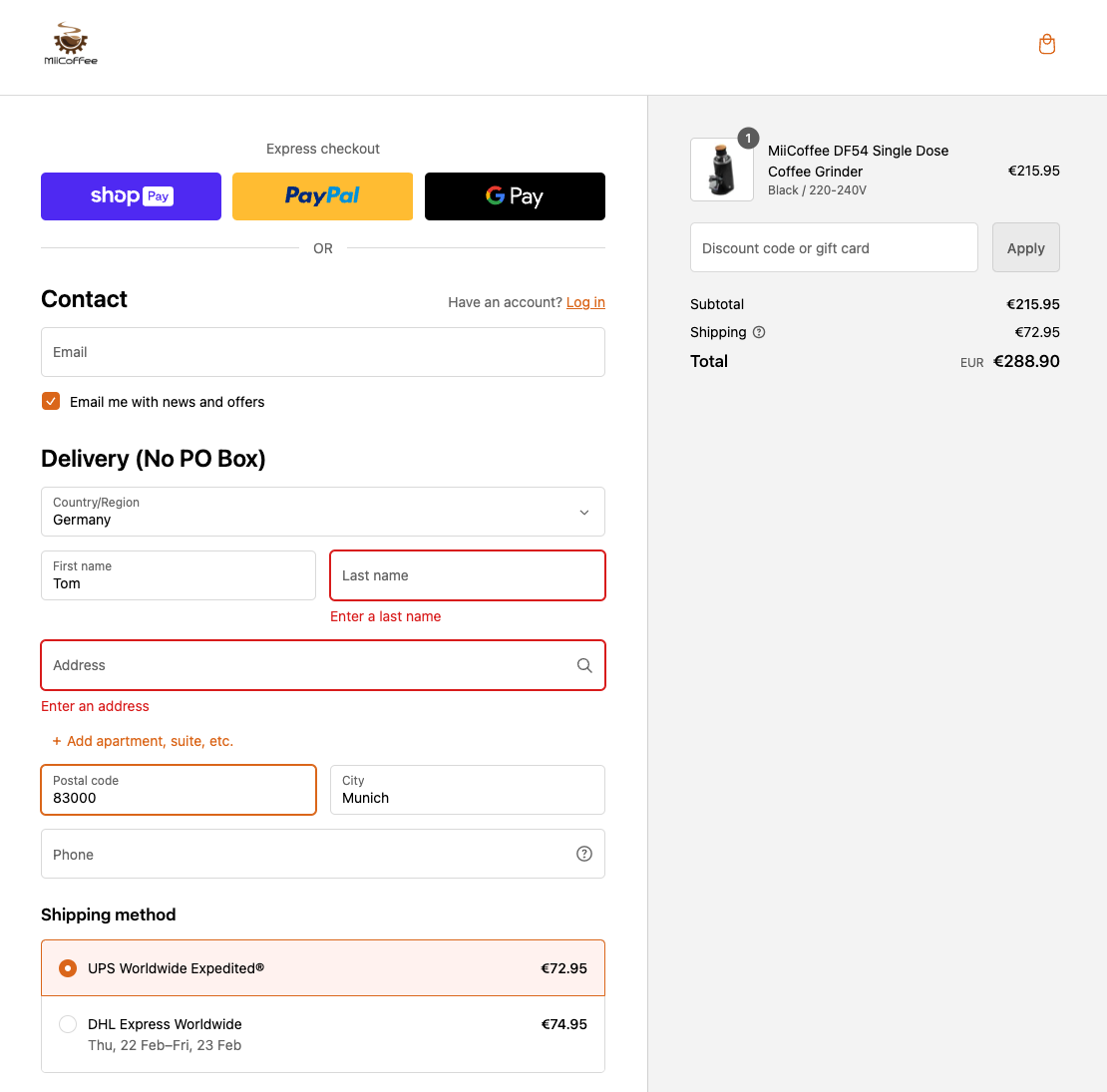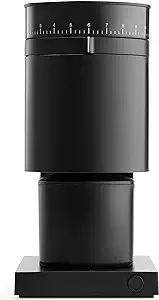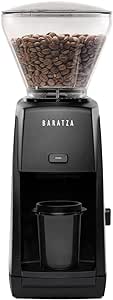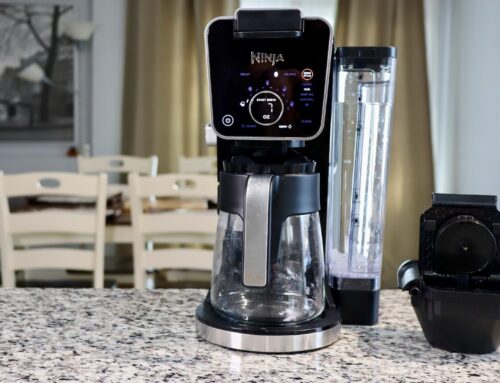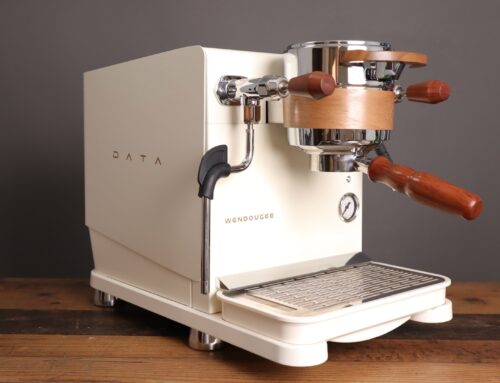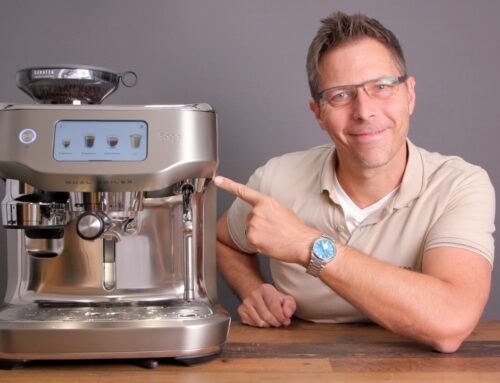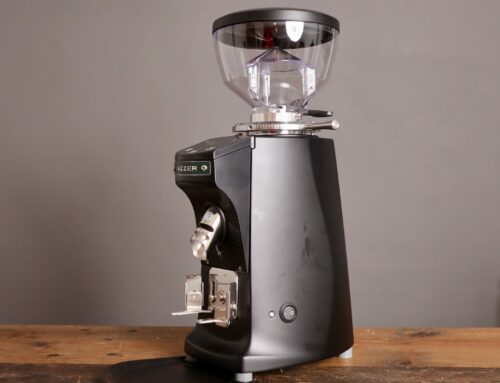DF54 Grinder Review – The Best of the Budget Grinders?
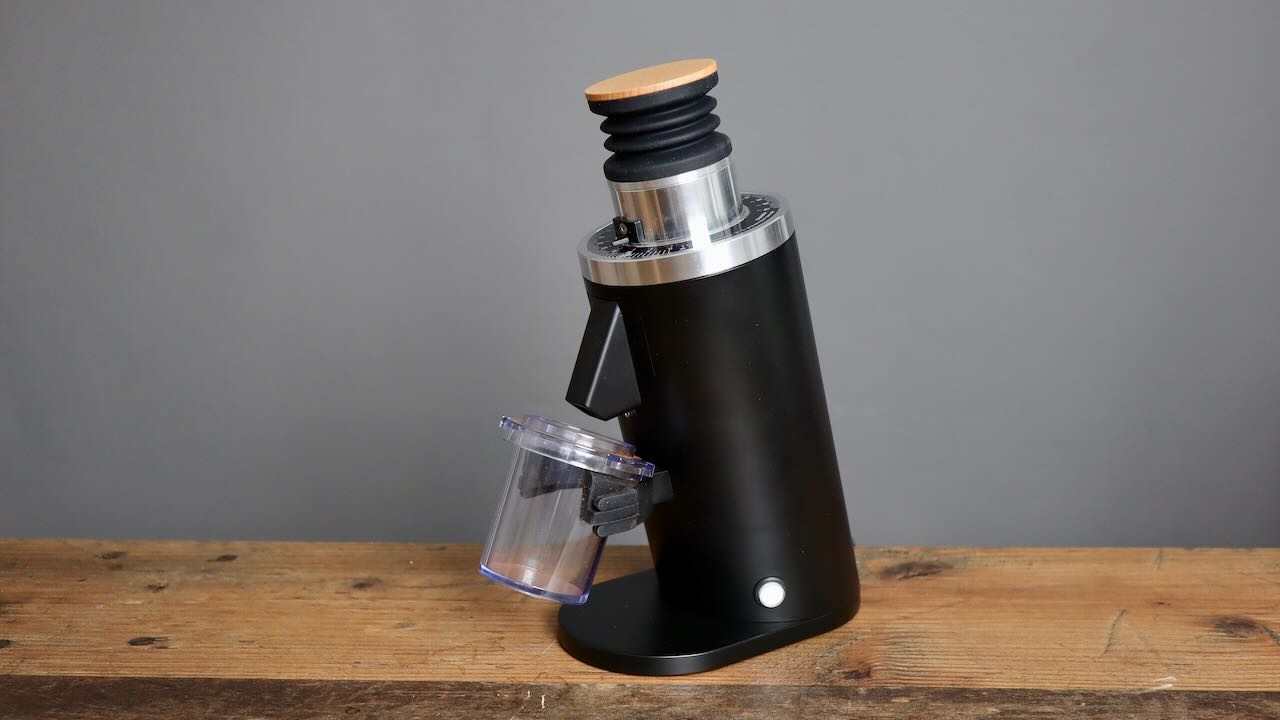
Introducing the DF54 Grinder
The DF54 grinder fits the bill for many beginning coffee enthusiasts, mainly because the price is right. How they are able to manufacture a 54mm flat burr grinder for $229 is a riddle to me, but it’s great for us home baristas! But how is the quality? How is the workflow? Finally, how does it compare to similar options in the $200-300 price range? Let’s find out.
You are currently viewing a placeholder content from YouTube. To access the actual content, click the button below. Please note that doing so will share data with third-party providers.
More InformationThe Looks and Features
If you like the look of the DF64, you’ll like the look of the DF54, as it takes many design cues from its bigger brother. It’s shape is a cylinder, slanted forward towards the user, atop a sturdy base. Reaching out from the cylinder is a semicircular forked portafilter holder, this time equipped with a delightful angled rubber dosing cup holder. This works way better then the previous models!
Moving up from there, we see an exit chamber that resembles a nose. What’s great about this new development, is that it is equipped with an anti-static or de-ionizing voltage, in order to reduce the amount of static coming out. The result is nice, fluffy, static free grinds.
North of the exit chamber is the rotary dial for adjusting the grind. It ranges from 0 to 90, and I sit generally at 15 for espresso. I love the look and feel of the lunette, since it has crisp numbers, housed in glass. The look and feel is elegant.
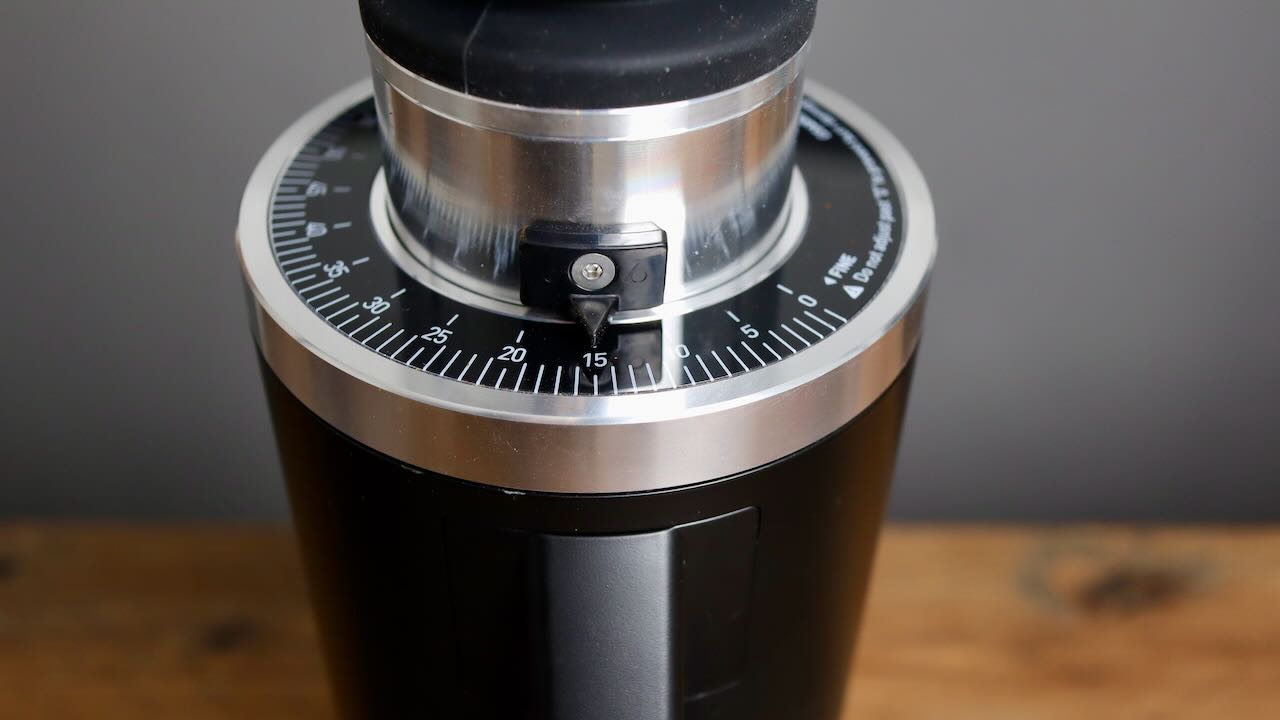
DF54 dial
Adjusting the grind is pretty smooth, but it does require two hands. It is stepless, and it has quite a bit of range. I don’t make turkish coffee, but I am sure that between 0 and 10 it must grind powder fine, for turkish coffee.
Above the dial is the dosing chamber, which includes an anti-popcorning disc on the inside, and a small rubber bellows upwards. Atop it all is a lightweight routed wooden disc as a cover. I like the dosing chamber just fine, but the bellows is prone to falling off when removing the wooden lid. That’s a bummer.
All in all, it’s a sleek design, that feels good to the touch. The DF54 is an all metal design, and the painted aluminum housing is well done.
How are the 54mm flat burrs?
Looking at the burrs, these are a conventional 3 holed design, for attaching to the burr carriers. Their geometry shows some aggressive cutting angles, and relatively large pre-breaking hollows. You’ll notice in the picture (just after I ground for an espresso shot), that the burr chamber is nearly devoid of any grinds, but of course the powder does remain caked onto the burr edges, and in the screw holes.
What I do quite like about the design on the DF54, is that the wave washer is held on by a rubber O ring, as shown below.
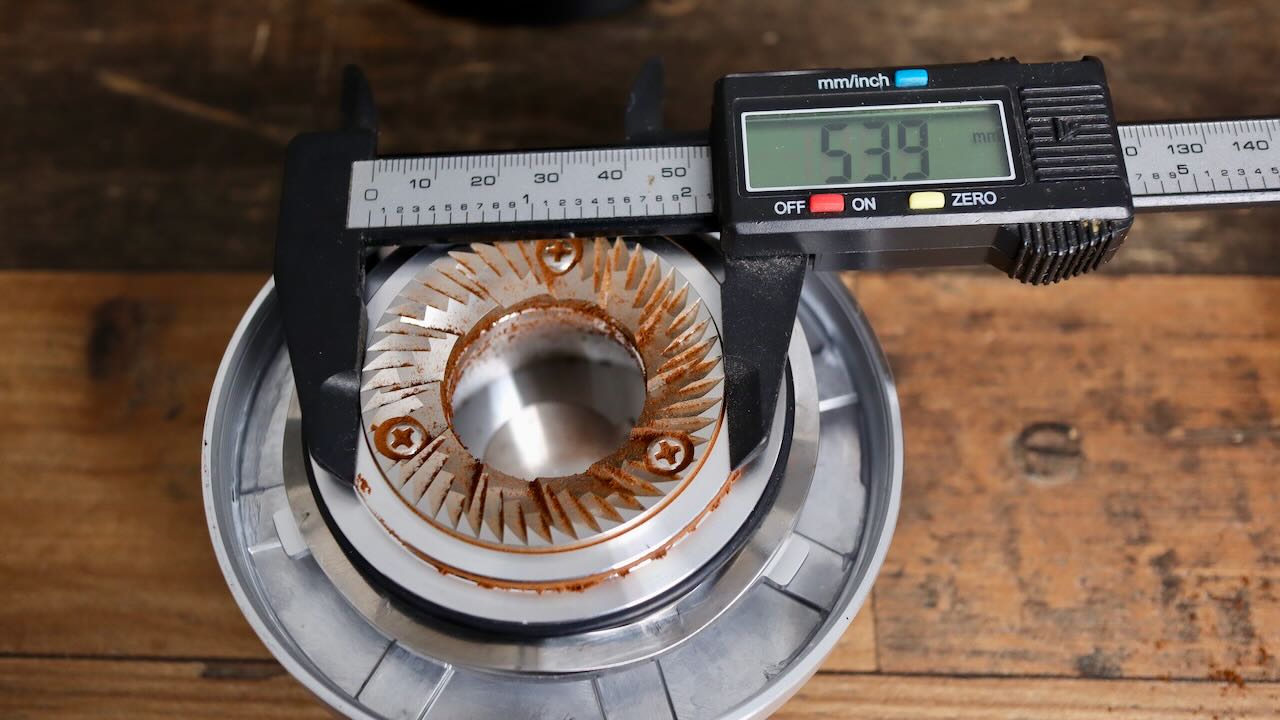
DF54 grinder has 54mm burrs
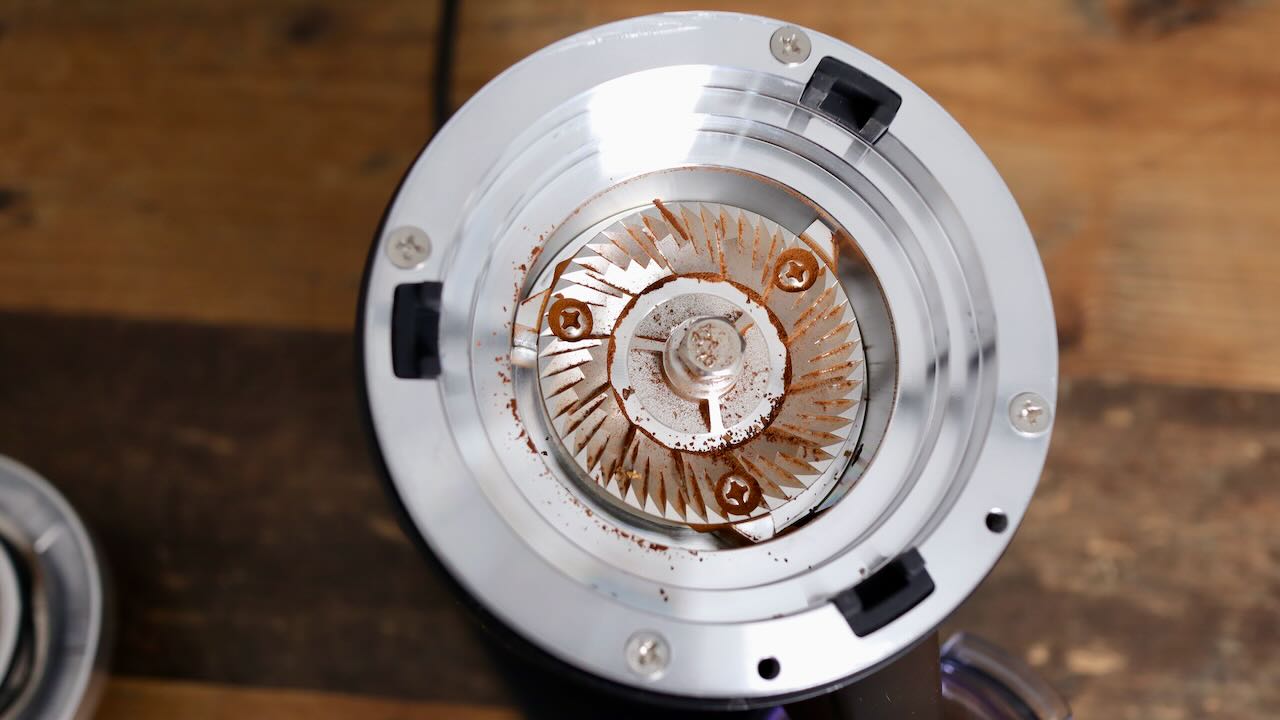
DF54 chamber almost empty
How is the retention?
Retention on the DF54 after using the bellows is very low – usually around 0.1 to 0.2 grams. The grinding chamber and exit chute remain quite devoid of grounds, but no amount of mashing the bellows is going to get the caked on powder removes from the screws, screw holes, and vertical edges of the burr’s cutting blades.
Compared to other low retention grinders, this fairs very well, and I think it sets a new standard in this price range. The Fellow Opus has no bellows, and therefore often had a higher retention for me.
De-ionizer
Static causes lots of problems in everyday life, also at work for me. We have to ground our machines, to avoid electromagnetic effects from the static build up. Also, on our film machines, we need to remove the static while unrolling the film, so that the film can be guided properly.
What does this have to do with espresso? Well, it’s the same principle and solution. Coffee beans while being ground build up static, that causes them to stray when exiting the chute, creating a mess. The de-ionizer uses two pins across which there is a small voltage potential, to remove the static from the grounds as they exit the chute. Awesome!
So how does the DF54 perform for Espresso and Pour Over?
I love using the DF54 for espresso grinding. The result is a nice mound of static free grounds, for easy transfer to my portafilter. I have gotten some really nice and balanced shots from the DF54 for espresso, accentuating the chocolate notes, and sometimes the citrus fruit notes from some roasts.
The DF54 can of course grind for pour over and other methods as well, and it does a fine job. I compared it to the DF83, and I could sense a difference however. The DF83 made for a juicier coffee, with more clarity, or separation in flavors. But the cup from the DF54, while slightly more muddled, was still tasty to drink.
Ultimately, I find the DF54 does best for espresso, as least for me. But then again, I also have the most experience in preparing espresso.
DF54 vs Eureka Mignon?
I love Eureka’s grinders, but the DF54 brings some serious competition. I’d say you’re getting similar grind results, for a fraction of the price. That being said, the Mignon has a more powerful motor, is made in Italy, and has 100 years of heritage behind the brand.
DF54 vs Mahlkönig X54?
The DF54 is actually much better than the X54 in many ways:
- 150 watt motor (X54 has just 70 watts)
- much easier to adjust the grind
- lower retention
- much lower price
On the other hand, with the Mahlkönig you are getting an extremely well established brand, which is often used in coffee shops all over the world. So, Mahlkönig certainly wins on heritage alone.
The X54 also has a wifi module and digital display. The design is cool, but the result is no more impressive than the DF54 for me, and I really wish it had a larger motor.
Both units are made in China, by the way.
DF54 vs Fellow Opus vs Baratza ESP?
If you’re looking for a single dosing grinder, the DF54 beats the rest in this price range, easy. All of the above grinders are made in China, although the Baratza and Fellow are designed anyway in the USA. But the DF54 has much better build quality, a straight forward grind dial, and in my opinion looks more stately on the counter, too.
The only caveat is that the Baratza can grind faster, around 1.5 grams per second for espresso, while the DF54 and Opus are both slower, I think due to the de-ionizer.
Pros and Cons of the DF54?
Well I mean, this grinder’s a no brainer. For the price, you’re getting a flat burr grinder with a sweet adjustment dial, and even a de-ionizer. The only thing is, due to the de-ionizer, it grinds slow, at about 1 gram per second for espresso. But the build quality is solid, it does a great job in the cup, and is fun to use. What more could you ask for, as a budding home barista?
Pros:
- Solid build quality, full metal construction
- Single dosing with low retention
- De-ionizer included!
- Angled catch cup welcome update
- Excellent value
Cons
- Bellows likes to fall off
- Grinds slow: 1 g/s for espresso
- Not many aftermarket 54mm burr options to ry out
- White label product – unclear who the manufacturer is
- Design and build in China
Specifications of the DF54:
– Dimensions: 7” D, 4.5” W, 12” H
– Weight: 10 pounds
– 150 watt machine
– Build Materials: metal (painted aluminum)
– 1 year warranty with MiiCoffee
– Country of Origin: China
Find your DF54 here:
What about import fees into the EU?
While the $229 price may sound attractive, European residents must consider additional taxes. The highest tax will be the VAT, which is for example 19% in Germany. Then, you may also have an additional tax, based on what the item is, and you might also have to pay a fee to FedEx or DHL for preparing and remitting the taxes for you. For our example of the DF54, it would cost €46.65 to import into Germany.
Shipping also costs quite a bit, based on location. For Germany, it is €72. The good thing is, shipping is super fast, like 2-3 days for me, and it is tracked as well.
All that being said, if you have to add another €119 to the price, then the DF54 becomes about €329 at the current exchange rate, and for that you could get a Eureka Mignon Manuale, Classico, or nearly a Specialita.
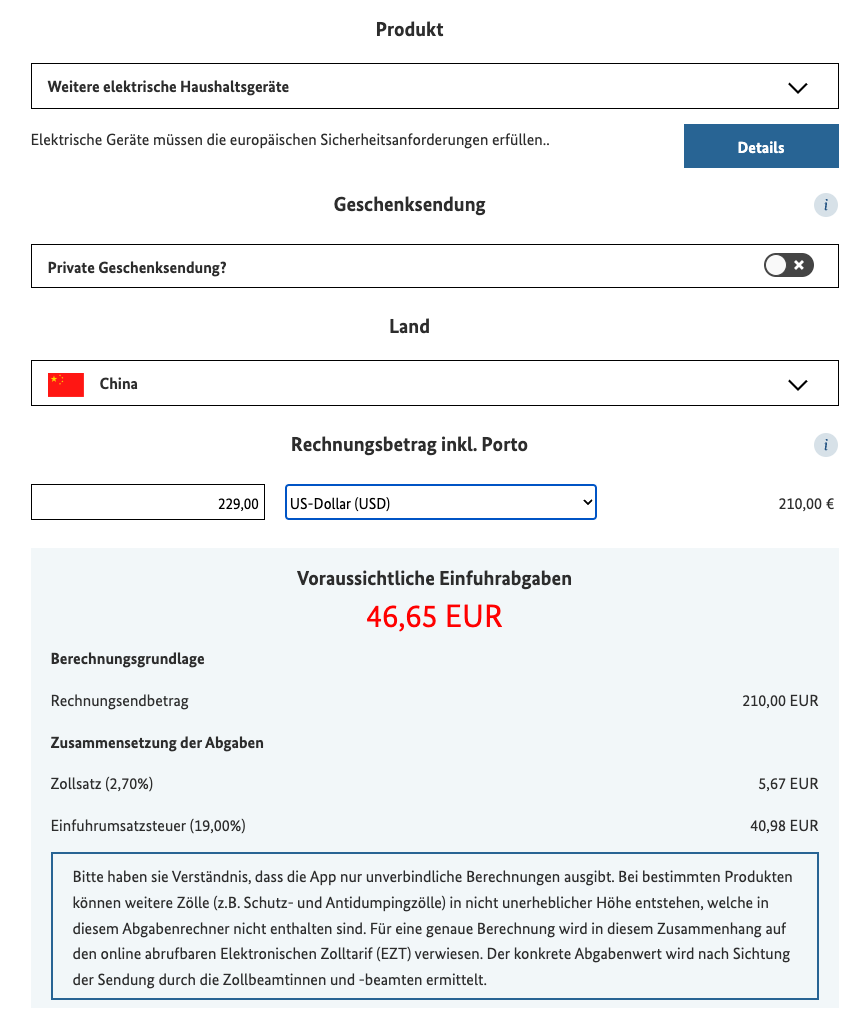
Import fees to Germany
Excerpt: https://www.zoll.de/DE/Privatpersonen/Postsendungen-Internetbestellungen/Abgabenrechner-Zoll-und-Post/abgabenrechner-zoll-und-post_node.html
